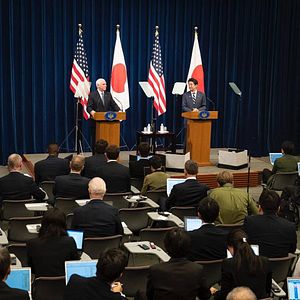The United States seeks collaboration, not control, in the Indo-Pacific region, Vice President Mike Pence said during a visit to Japan this week, adding that there was no place for authoritarianism and aggression.
Pence took the opportunity to lay out a vision statement for the region after meeting with Japanese Prime Minister Shinzo Abe in Tokyo on November 13. The pair then traveled on to Singapore for regional summits.
Abe and Pence said the two countries had “reaffirmed their shared goal of bolstering a free and open Indo-Pacific” and also took note of progress in their joint efforts to develop energy, infrastructure, and digital connectivity across the region.
Addressing reporters after the meeting, Pence said a free and open Indo-Pacific was a goal that could not be imposed. Instead, he argued, “it must be built, nation by nation, through strong partnerships.” Pence cited the bond between the United States and Japan as a model for nations across the Indo-Pacific and the world.
Elaborating on the high-level vision, Pence said:
In all that we do, the United States seeks collaboration, not control. We seek an Indo-Pacific where every nation, from the shores of the Indian Ocean to the West Coast of the Americas, east to west, north to south, are free to follow their own path, pursue their own interests, and where the seas and skies are open to all engaged in peaceful activity; where sovereign nations grow stronger together. Authoritarianism and aggression have no place in the Indo-Pacific. And I know this vision is shared by the United States and Japan.
The United States would “continue to ensure that all nations, large and small, can thrive and prosper in a free and open Indo-Pacific,” Pence continued.
There were few, if any, signs of disagreement after the meeting between Abe and Pence, with the pair taking the opportunity to once again insist that sanctions on North Korea remain in force until the regime denuclearizes.
Pence confirmed that another summit between U.S. President Donald Trump and North Korean leader Kim Jong Un was being arranged, but added that the process would not be driven by artificial deadlines. The United States and Japan would continue to work together on the monitoring of banned ship-to-ship transfers.
Pence also welcomed the decision reached by Trump and Abe in September to begin negotiations on a bilateral trade agreement. Trump has frequently complained about Japan’s trade surplus with the United States. As recently as November 7, the day after the U.S. midterm elections, Trump declared that “Japan has treated us very unfairly” on trade.
Pence said the negotiations would begin soon, adding: “And when completed, we’re confident that this agreement will establish terms on goods, as well as on other key areas, including services.”
Abe said the two sides wanted to expand trade and investment in a way that was “beneficial to us both, in line with the Japan-U.S. Joint Statement agreed in September.”
The September statement indicated that the Americans would seek to increase motor vehicle production and jobs in the United States. The Japanese side signaled that it would not grant levels of market access for agricultural, forestry, and fishery products beyond the limits laid out in Japan’s previous economic partnership agreements. In the meantime, both sides pledged to refrain from taking actions against the spirit of their agreement – a key commitment at a time when Japan has been worried about the potential economic impact of Trump’s threatened tariffs on the automotive sector.
Abe and Pence sought to portray a positive picture of the state of bilateral relations. They also highlighted several technical agreements finalized this week. These included a memorandum of cooperation to promote research and development in the nuclear energy sector. The agreement, announced on November 13, aims to encourage private sector and university researchers to develop advanced nuclear reactors.
The previous day, Japan and the United States had taken a step forward with Australia on a scheme to develop quality infrastructure projects in the Indo-Pacific.
The Japan Bank for International Cooperation said the memorandum of understanding – signed with the U.S. Overseas Private Investment Corporation, Australia’s Department of Foreign Affairs and Trade, and Australia’s Export Finance and Insurance Corporation – was intended to drive projects in the infrastructure, energy, and natural resources sectors in third countries. It would seek to spur cooperation among Japanese, American, and Australian companies.
Pence told reporters: “Through enhanced cooperation on development financing, we will help build up the immense Indo-Pacific together.”
































